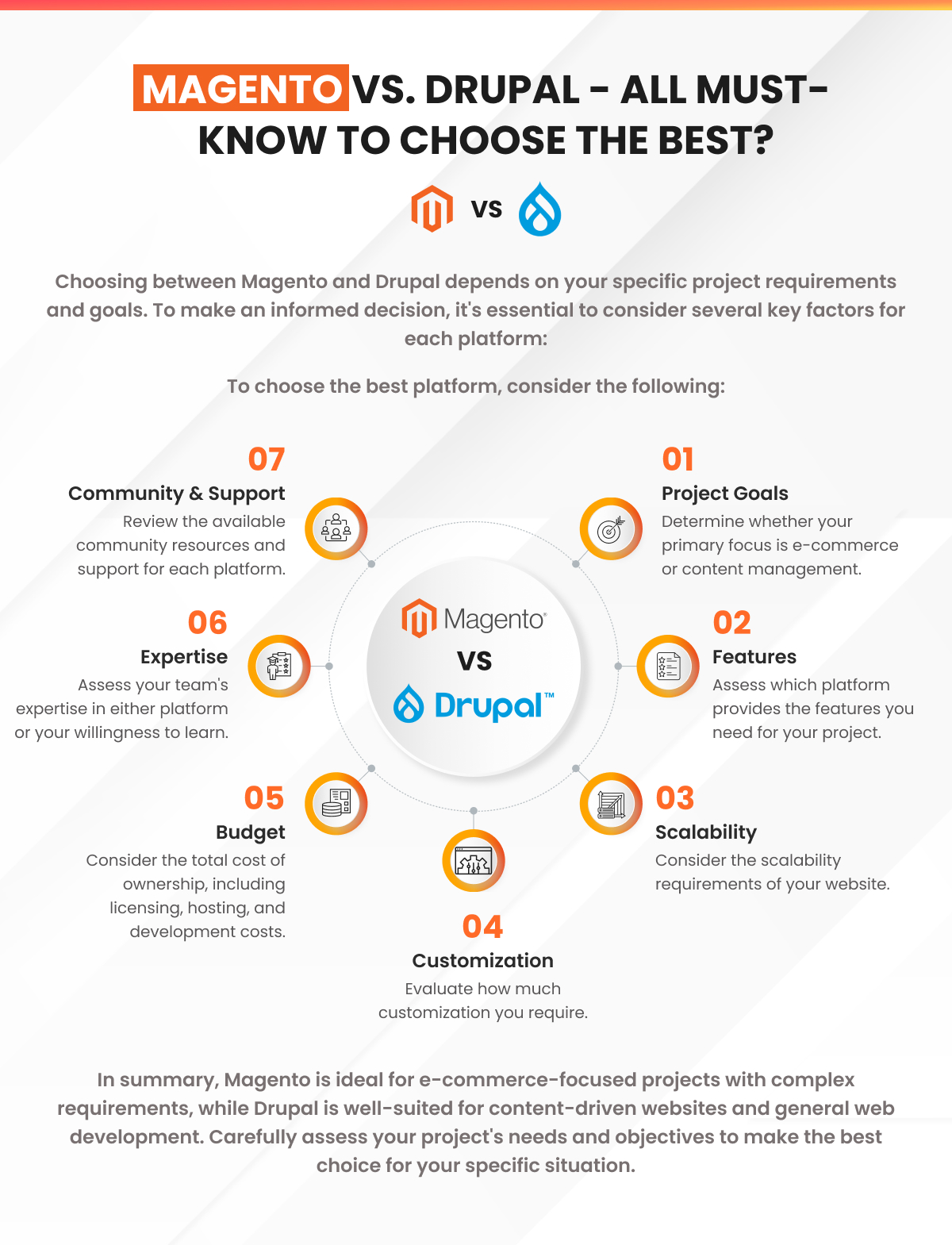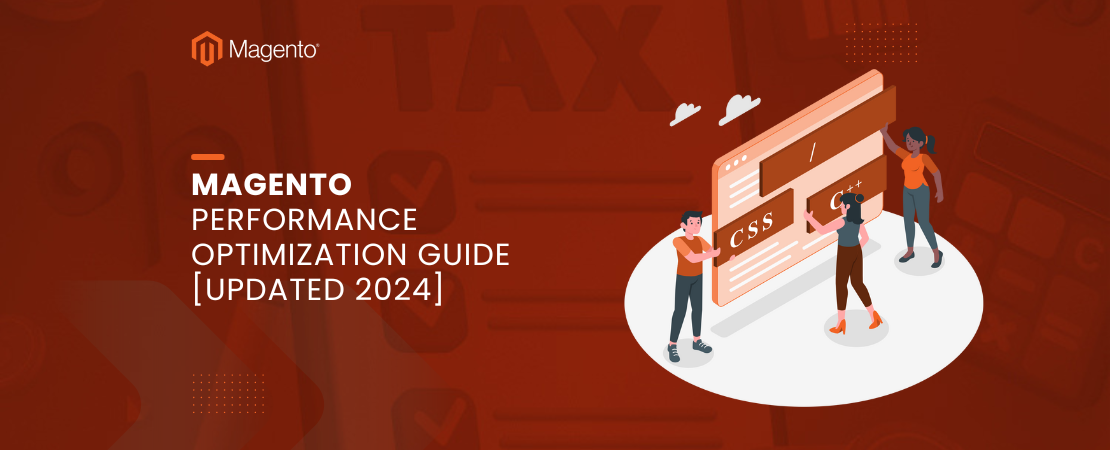During the pandemic, we have seen the demand for online shopping increase exponentially. To accommodate this demand, many businesses have moved online. If you’re looking to relocate your business online, some platforms worth looking into are Magento and Drupal.
This article will shed light on the topic of Magento Vs Drupal— two of today’s most widely used eCommerce platforms.
We’ll compare the two open-sourced platforms on the basis of popularity, features as well as scalability, content management, SEO, and pricing.
What is Magento?
This eCommerce software has gathered a lot of acclaim over the last couple of years. Thanks to its flexible modular structure coupled with helpful methods to scale and UX, Magento has been able to quickly add some large corporations to its Rolodex. These include top brands such as Land Rover, Nestle Nespresso, Jaguar, and Sigma Beauty.
This open platform is written in PHP and was established in 2008 by Varien. According to our sources, the platform has powered approximately 250,000 businesses. The platform has two versions Magento Community Edition (CE) and Enterprise Edition (EE). The first version is an open-source, free plan that offers you key features and extensions that are enough for you to run your business in a simple and straightforward manner.
Magento EE is a more deluxe version of Magento; designed specifically for large-scale businesses with more advanced features and functionalities.
What is Drupal?
Drupal is another popular open-source eCommerce platform that’s been developed in PHP. Much like Magento, there are two versions of this software— Drupal 7 and Drupal 8. However, what sets this apart from Magento is that you’re able to create various types of websites using it— not limited to just eCommerce websites.
Magento Vs Drupal: Popularity
Magento is quite popularly used by many eCommerce businesses. According to our research, Magento runs over 212,000 live websites on its platform, with over 755,000 websites using it to host their business. The eCommerce platform’s traffic comes from all over the world, especially in the West, including the US, UK, and Canada.
Drupal’s market share is about 4.6%. This means that about 2.3% of all websites choose to use Drupal.
Magento Vs Drupal: Features & Functionalities
For some time now, Magento has dominated the eCommerce industry as one of the foremost platforms out there. It was designed to host key features that would contribute towards a seamless user experience. Both the open-source and the Magento EE come with in-built features. Below are some B2B features that make the Enterprise version popular amongst growing businesses:
- Visual merchandiser
- Coupons, rewards, and loyalty
- Shared catalog
- Company account
- Quotes and requisition lists
- Events and private sales
- B2B company credit
- Customer segmentation
- Rule-based related products
On the other hand, Drupal provides its clients with functions more basic functions such as order tracking as well as payment processing and shipping features. Moreover, as a user, you’ll have access to discount pricing and the calculation of fees or ads.
Thus, when it comes to discussing key features and functionalities in this Magento Vs Drupal debate, Magento is thorough in providing stronger features for its clients.
| Aspect | Magento | Drupal |
|---|---|---|
| Primary Use Case | E-commerce platform | Content management system (CMS) |
| Development Language | PHP | PHP |
| Community Support | Strong community support with a large user base and extensive documentation | Active community support with a focus on content management and web development |
| Ease of Use | Requires some technical expertise and is geared towards e-commerce professionals | Relatively user-friendly for content management and website development, but may require technical knowledge for advanced customization |
| Customization | Highly customizable for e-commerce needs, with a wide range of extensions and themes available | Highly customizable for various web development needs, with a wide range of modules and themes |
| Content Management | Not the primary focus, but has CMS capabilities with limited features | Built primarily as a CMS with robust content management capabilities |
| E-commerce Features | Strong e-commerce features, including product catalogs, shopping carts, and payment gateways | Limited e-commerce features out-of-the-box, but can be extended with modules |
| Scalability | Scalable for large e-commerce websites with built-in features for performance optimization | Scalable for a wide range of websites, but may require additional configuration for very large sites |
| SEO Capabilities | Strong SEO capabilities for e-commerce, including URL rewriting and meta tags | Good SEO capabilities for content-driven websites with customizable URL structures and meta tags |
| Security | Prioritizes e-commerce security with features like secure payment processing and regular security updates | Regular security updates but may require additional modules for advanced security features |
| Cost | Open-source (Community Edition) is free, but Enterprise Edition requires a license fee | Open-source and free, but there may be costs associated with third-party modules and hosting |
| Community Modules | A vast ecosystem of e-commerce-specific extensions and themes | A wide range of modules and themes for various web development purposes |
| Learning Curve | A steeper learning curve due to its specialized e-commerce focus | Relatively easier to learn, especially for content management and basic web development |
| Use Cases | Ideal for businesses focusing on online sales and e-commerce | Suitable for websites with content-heavy requirements, including blogs, news, and corporate sites |
Keep in mind that the choice between Magento and Drupal depends on your specific needs and goals. If you require a robust e-commerce platform, Magento may be the better choice, while Drupal is more suitable for content-driven websites and general web development. Additionally, both platforms have evolved over time, so it’s essential to consider the latest versions and features available at the time of your decision.
Magento Vs Drupal: Scalability
Scalability refers to how you will adapt to changes in market demand and supply as well as changes in the business model over time. This is an extremely important measure in our Magento Vs Drupal debate.
When it comes to managing how well your business will do with changes in website traffic, inventory fluctuations as well and product management, Magento is the ideal choice for larger businesses. With the help of its sturdy CMS system, Magento can easily handle up to 50,000 visits per hour. Moreover, versions within the Enterprise Edition allow better scalability and performance with regard to the client, app, database, and page cache.
You’ll be able to significantly reduce the amount of data returned from your server to the end pages. While Drupal offers the same scalability as Magento, it does have one drawback— Drupal’s platform is unable to categorize your products online as well as Magento can. Thus, in this facet of our Magento Vs Drupal, the former is the clear winner.
Magento Vs Drupal: Content Management
In this portion of the argument on Magento Vs Drupal, the latter is thought to have a stronger CMS. Your Drupal website will enable you to create an array of different content types by integrating different attributes and custom fields.
As opposed to this, Magento is thought to provide a standard content management system. With your website on Magento, you’ll be able to add pages and a smaller amount of content and attributes to your category pages. In order to make your page more content-centric, you’ll need to pay more and increase technical support.
Magento Vs Drupal: Learning Curve
Drupal is thought to be extremely easy to use by those who don’t have a lot of coding experience; if you’re looking for an interface that both admins and visitors are comfortable with, then this platform is for you. However, its neat and easy-to-use interface comes at a cost— the eCommerce platform simply does not provide its users with the SEO, marketing, features, or scalability that others like Magento would provide.
While Magento is for a little more tech-savvy person, you can always reach out to a dedicated developer/ Magento agency for help. One such Magento store development company is Folio3. Leverage our store development services for a smoother business with a reliable admin interface.
Magento Vs Drupal: Support
As we’ve mentioned before, Magento has multiple versions— there is the open-source Community version and the Enterprise edition, which is divided into Magento 1 and Magento 2. Magento support services vary depending on which version you use.
Users of the Community Edition can look for assistance from publications such as DevDocs and Magento Forums or get redirected to professional developers. On the other hand, if you’re a user of the Enterprise Edition, then you can also reach out for help through official email support or live support. This is much quicker.
Coming to Drupal Commerce, you must direct all your queries towards the Drupal Stack Exchange as well as the Slack support and a support forum. Moreover, the platform allows for a ticketing system. However, the downside is that Drupal Commerce (which is designed for eCommerce businesses) only has about 206 tagged questions on Stack Overflow.
This means that there is a chance that your query may not be addressed in a timely fashion. Thus, it seems like this facet of the Magento Vs Drupal argument is in favor of Magento for offering so many different support options.
Magento Vs Drupal: SEO
Magento’s platform is known for its SEO and marketing features. It has in-built search engine optimization tools that are extremely easy to use. However, for a Drupal website, this is something you would have to customize.
Using a Magento website, you’ll have access to meta tags, alt image tags as well as sitemap, and 301 redirects. All these features combine to give your store more visibility and a better ranking on SERPs. This means more and more people will begin to notice your store.
Apart from the built-in options, you’re able to install more SEO extensions to better your store’s optimization. A great example of this is the Magento 2 SEO Suite. Thus, when it comes to Magento Vs Drupal in terms of SEO, Magento is the better option by a margin.
Magento Vs Drupal: Pricing
This is perhaps the most important aspect of the Magento Vs Joomla argument when it comes to deciding which platform you need to run your eCommerce business through.
As we know, Magento is free to download. However, it does have a paid upgrade which depends on your business’s yearly gross merch as well as its average order value. If you go with the Magento Commerce Edition, it’ll set you back $22,000, while Enterprise Edition could cost you up to $40,000.
Comparatively, Drupal’s cost of entry is absolutely free. However, you will incur expenses such as the costs of development and the maintenance of the website. These alone can run you into the tens of thousands of dollars. With this in mind, we recommend Magento’s Community Edition for those on a tighter budget.
Conclusion
Magento Vs Drupal is certainly an interesting debate since the two are quite similar in a lot of aspects. However, we believe that due to its superior SEO, user-friendliness as well as support, and features, Magento is a stronger choice for anyone with a serious budget and technical skills. Drupal is ideal for people who want to create a multitude of business projects such as corporate websites, blogs, and social sites.
However, from a strictly eCommerce perspective, Magento has everything you’ll need.
FAQs:
Magento Vs Drupal: Which CMS is better for eCommerce?
Magento has a strong CMS that is ideal for launching eCommerce stores.
Is Magento cheaper than Drupal?
Magento’s open-source Community Edition is far cheaper than Drupal. Your Drupal development and maintenance costs stack up a high bill.
Should I replace Magento with Drupal for my eCommerce solution?
Magento is a better eCommerce platform in terms of pricing, support, SEO tools, and features. If you feel as though your needs aren’t being met, try upgrading to the Enterprise edition.
What is the development price for Magento in Canada?
According to our estimate, which depends heavily on how much work your site needs and how much time the developer has, Magento’s cost will be between $15–$250/hour.
What is the Best IDE for Magento?
- PHPStorm
- NetBeans
- Notepad++
- TextMate
Is Folio3 an affordable company for Magento Development?
Folio3 has years of experience providing Magento development for its clients. It’s thought to be reliable and affordable by many all over the world. Head on over to our website and check out our pricing plans.








